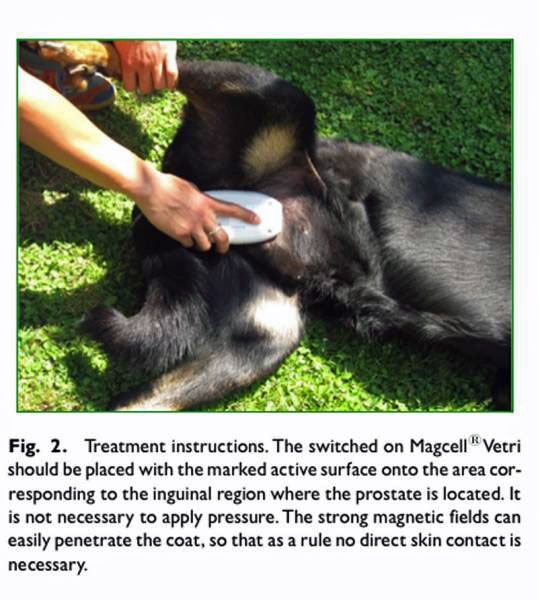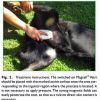Tel: +44 (0)115 9167685
Effect of Pulsed Electromagnetic Field Therapy on Prostate Volume and Vascularity in theTreatment of Benign Prostatic Hyperplasia: A Pilot Study in a Canine Mode
BACKGROUND.
Benign prostatic hyperplasia (BPH) is a result of urogenital aging. Recent studies suggest that an age-related impairment of the blood supply to the lower urinary tract plays a role in the development of BPH and thus may be a contributing factor in the pathogenesis of BPH. The canine prostate is a model for understanding abnormal growth of the human prostate gland. We studied the efficacy of pulsed electromagnetic field therapy (PEMF) in dogs to modify prostate blood flow and evaluated its effect on BPH.
METHODS.
PEMF (5min, twice a day for 3 weeks) was performed on 20 dogs affected by BPH. Prostatic volume, Doppler assessment by ultrasonography, libido, semen quality, testosterone levels, and seminal plasma volume, composition and pH were evaluated before and after treatment.
RESULTS
The 3 weeks of PEMF produced a significant reduction in prostatic volume (average 57%) without any interference with semen quality, testosterone levels or libido. Doppler parameters showed a reduction of peripheral resistances and a progressive reduction throughout the trial of the systolic peak velocity, end-diastolic velocity, mean velocity, mean, and peak gradient of the blood flow in the dorsal branch of the prostatic artery. The pulsatility index and the resistance index did not vary significantly over time.
CONCLUSIONS
The efficacy of PEMF on BPH in dogs, with no side effects, suggests the suitability of this treatment in humans and supports the hypothesis that impairment of blood supply to the lower urinary tract may be a causative factor in the development of BPH.
Authors: Raffaella Leoci, 1* Giulio Aiudi,1 Fabio Silvestre, 1 Elaine Lissner, 2 and Giovanni Michele Lacalandra 1 - Department of Emergency and Organ Transplantation (DETO), Section of Veterinary Clinic and Animal Production, University of Bari Aldo Moro, Valenzano, Bari,Italy 2, Parsemus Foundation, Berkeley, California

Author: Dr. Raffaella Leoci
- Permission received by Dr. Raffaella Leoci on 25.9.14 to show abstract and images of study on PhysioEquipment website
Latest News
-
Osteoarthritis: Hobbling to Happy - Magcell Arthro Reduces Pain and Swelling
- May 09, 2024 -
Mrs B Beats Bunion Pain with the Magcell Arthro
- Jan 23, 2024 -
Benign Prostatic Hyperplasia (BPH) Self Care with Magcell Microcirc
- Jan 03, 2024 -
New, Improved, LASS-Expert Is Now Available
- Oct 14, 2023 -
LASS-Expert Now Improved
- Sep 29, 2023
Tags
- Magcell (2)
- pain (1)
- jack russell (1)
- injury (1)
- athlete (1)
- fracture (1)
- cartilage (1)
- osteoarthritis (1)
- Mag-Expert (1)
- magcell microcirc (1)
Archives
- May 2024 (1)
- January 2024 (2)
- October 2023 (1)
- September 2023 (1)
- September 2022 (1)
- February 2022 (1)
- October 2021 (5)
- June 2021 (4)
- December 2020 (1)
- November 2020 (1)



